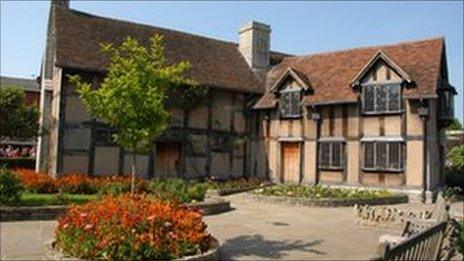Coronavirus: Stratford-upon-Avon's tourism trade hit hard by lockdown
- Published
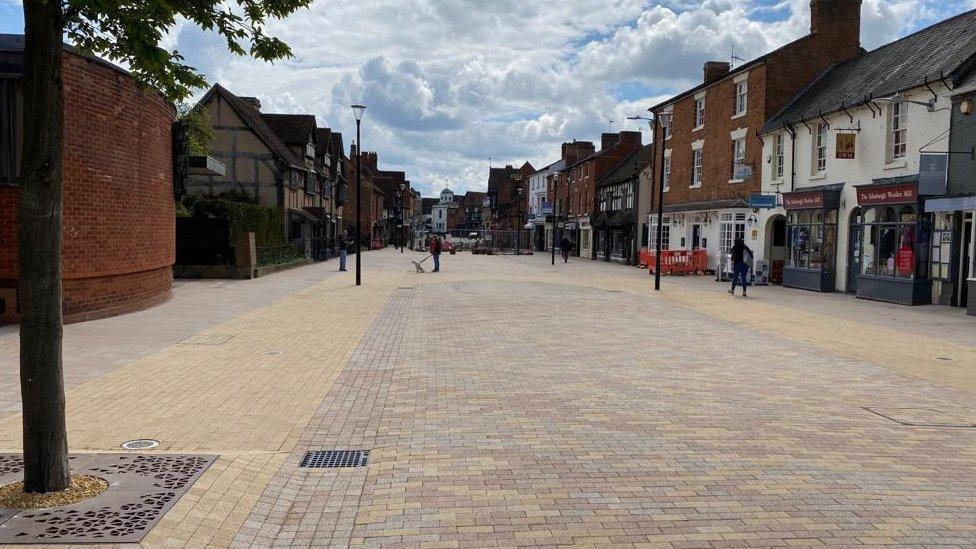
Henley Street, the site of Shakespeare's Birthplace, which would normally be teeming with visitors, is almost deserted during the lockdown
Stratford-upon-Avon, which attracts up to six million visitors annually as the birthplace of William Shakespeare, could lose almost half its income this year because of coronavirus and the lockdown, experts have calculated.
The lack of tourists is already being felt in the town but businesses said they were also concerned about the future impact of any protracted shutdown and social distancing measures.
The town's reliance on tourism meant it was going to be "badly hit by a perfect storm", said councillor Daren Pemberton, deputy leader of Stratford-on-Avon District Council. But he said the authorities had been working on measures to protect the historic town.
Almost overnight in March, the majority of Stratford's business suddenly stopped.
When Prime Minister Boris Johnson announced on 16 March people "should avoid pubs, clubs, theatres and other such social venues", the Royal Shakespeare Company closed the Swan Theatre, with many of its other attractions and venues forced to follow suit.
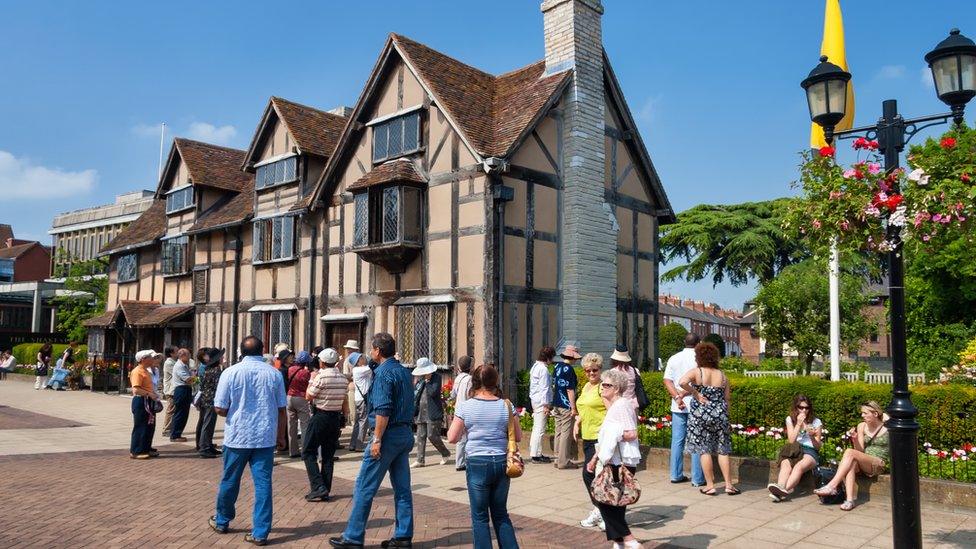
The Shakespeare Birthplace Trust said six million visits are made to Stratford-upon-Avon every year
The Shakespeare Birthplace Trust cares for William Shakespeare's family homes, which it expected to bring in £10m this year. It said its income was now predicted to fall by between £7m and £8m.
"The impact of Covid-19 on Stratford-upon-Avon has been immediate and plain to see," said its CEO, Tim Cooke.
"It is home to the world's richest Shakespearian heritage, which the trust cares for, a jewel in the crown of 'Brand Britain' and the economy of the West Midlands, attracting six million visitors a year. Now it lies empty.
"As an independent charity, we rely on those visitors for the vast majority of our income, like many businesses and organisations in the town."
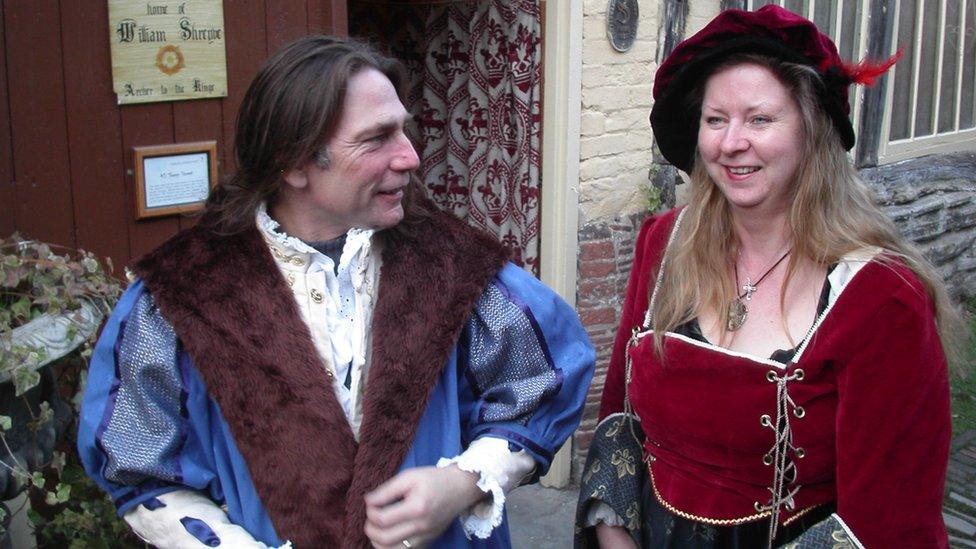
John and Janet Ford run Tudor World museum
The closures and cancellations have hit other attractions in the town too - and some of them had already begun to feel the impact before the lockdown measures were introduced.
John Ford, who has run Tudor World since 2007, said for him the first sign of the problems to be caused by the pandemic came when French and Italian school parties started cancelling their visits.
Mr Ford has since closed the museum and furloughed four members of staff.
"I think it is not knowing when we were going to open, we can't plan," he said.
"I could probably cope until the end of June, I would have to subsidise it from my personal finances... because our fixed costs are still there."
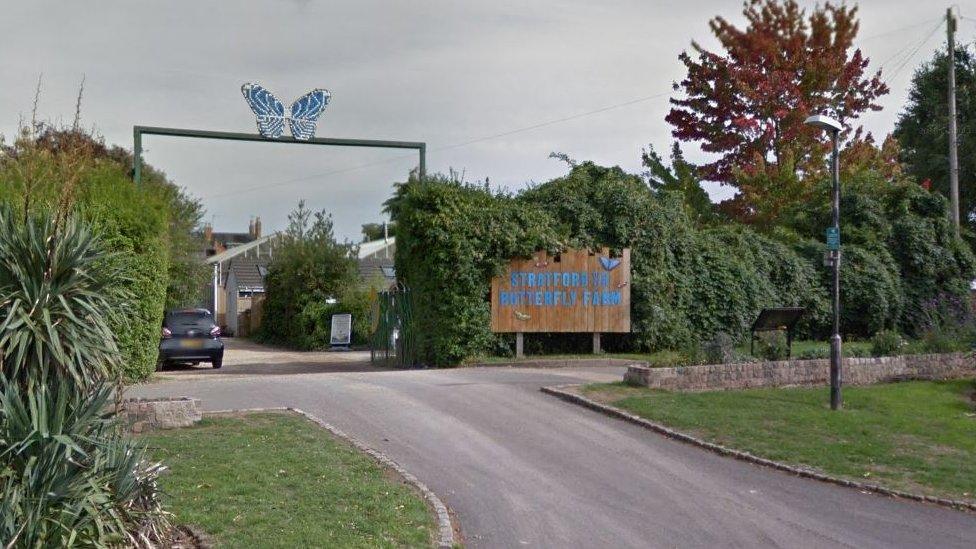
Stratford Butterfly Farm closed the morning before lockdown was announced
Also affected by cancelled continental school parties was Stratford Butterfly Farm.
Despite being closed to the public, marketing manager Jane Kendrick said the farm still had weekly outgoings of £4,000, as some members of staff have remained on site daily to care for its animal attractions.
"Coming out of the February half term into March is when visitor numbers usually start to pick up," she said.
"To put it into context, this time last year we were making £10,000 per week."
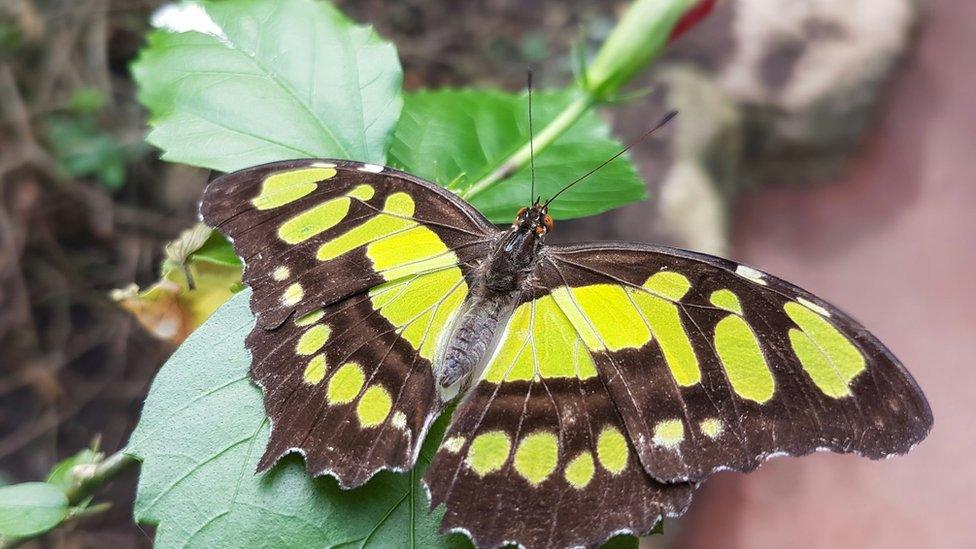
Stratford Butterfly Farm also imports and exports pupa, with that side of the business also affected by coronavirus
As well as the visitor attraction, the farm also has a business importing pupae from the tropics and distributing them to attractions in Europe.
It was able to get a delivery for the first time in two weeks last weekend.
"We thought our biggest battle this year would be Brexit," Ms Kendrick said.
"This has completely floored us."
Some business owners fear the end of lockdown will not be the end of their financial worries.
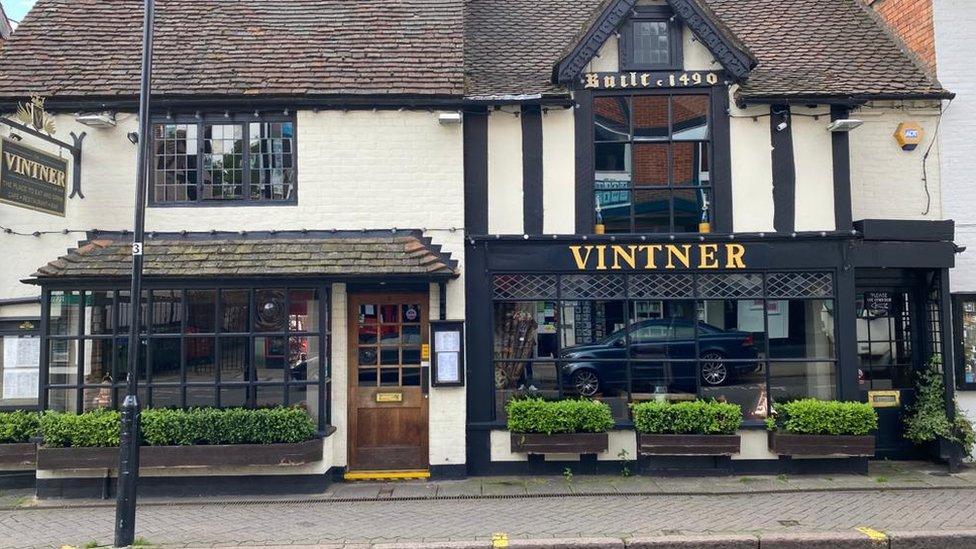
Pubs and restaurants will struggle to survive if they have to operate under social distancing, says Nigel Lambert, who runs Vintner
Nigel Lambert, who runs restaurants Vintner, Lambs and The Opposition, with partner Marcos Torres, said he had concerns about how they would operate if distancing measures continued once the doors were open.
"I don't think restaurants and bars will be able to operate until there is a vaccine," he said.
"If we reopen with social distancing, we still have to pay rent, lighting, power, wages and yet we will probably be doing 20% of the turnover we would normally do. It is not viable, it wouldn't work."
Mr Pemberton, the deputy council leader, said it was always likely the town would suffer.
"This stands to reason because many of our key businesses are in the tourism and hospitality sectors, which will be the last out of lockdown," he said. "And the automotive and manufacturing sectors will be deeply affected by the inevitable worldwide slowdown.
"We've already started doing the critical thinking, our future decisions will be crucial to supporting and enabling recovery and we are already shaping our economic plans by engaging with businesses, local authority partners and other key stakeholders.
"At the same time we are already lobbying our local MPs and central government about the issues that we will face in the future."
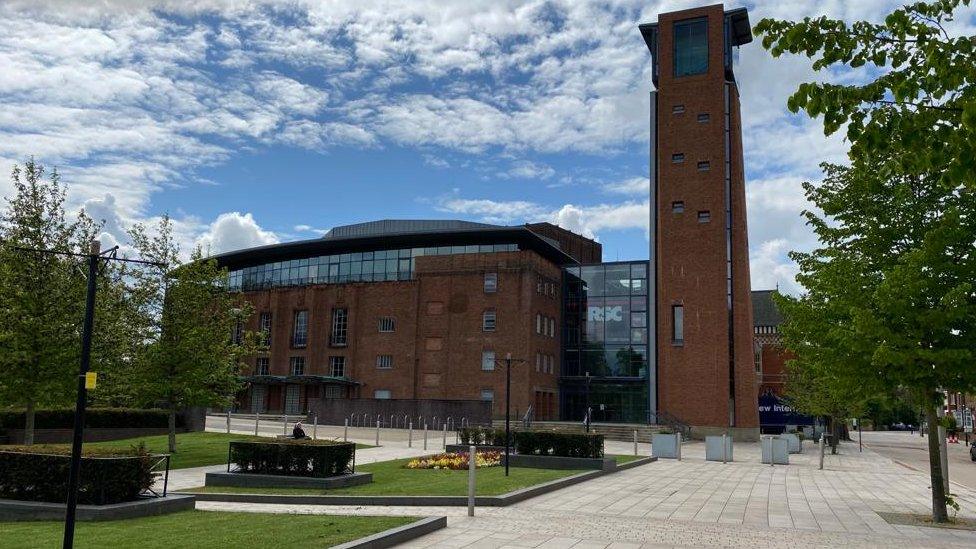
The Royal Shakespeare Company announced it would close the Swan Theatre on 9 April
A West Midlands Regional Economic Development Institute report, external has estimated Stratford-upon-Avon would see a 46% reduction in its Gross Value Added - the measure of the value of goods and services produced in an area - in the second quarter of the year.
Rebecca Riley, who co-authored the report, said recovery would depend on how lockdown progressed.
"A lot of forecasters and commentators believe the last thing to come out will be tourism," she said.
"With Stratford somewhere that relies on international visitors, there may be some rules and regulations on travel, and until they are lifted, Stratford will continue to suffer."
She said many organisations would already be looking at how to "bounce back" after lockdown was lifted, with Stratford no exception.
"Stratford should look at less international, more local," she said. "How do they rebalance their tourism strategy or procurement strategy to make their offer more attractive to local tourists?
"I can't imagine the environment for people going abroad for holidays will change, so they will need to make more of the staycation."
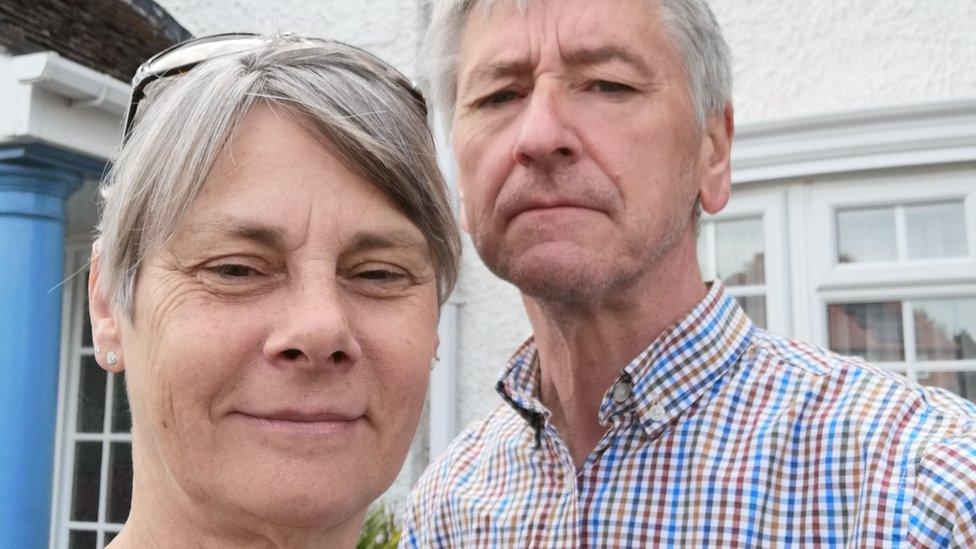
Denise and Andrew Perkin run White Sails
Denise and Andrew Perkin have run White Sails bed and breakfast in Stratford-upon-Avon since 2013 and took the decision to close their business on 20 March.
Although they admitted money had been a "big worry", they were optimistic about a future after lockdown.
The couple have looked at measures they could introduce should they be able to open under social distancing, such as offering fewer rooms and separating tables.
Although there have been cancellations, Mrs Perkin said she was hopeful customers would return once the restrictions had been lifted.
"Most people we have had a phone call from are booking for later in the year or next year," she said.
"They want to come back, they just can't at the moment," she said.

A SIMPLE GUIDE: How do I protect myself?
AVOIDING CONTACT: The rules on self-isolation and exercise
HOPE AND LOSS: Your coronavirus stories
LOOK-UP TOOL: Check cases in your area

Follow BBC West Midlands on Facebook, external, Twitter, external and Instagram, external. Send your story ideas to: newsonline.westmidlands@bbc.co.uk , external
- Published24 January 2021

- Published25 April 2020
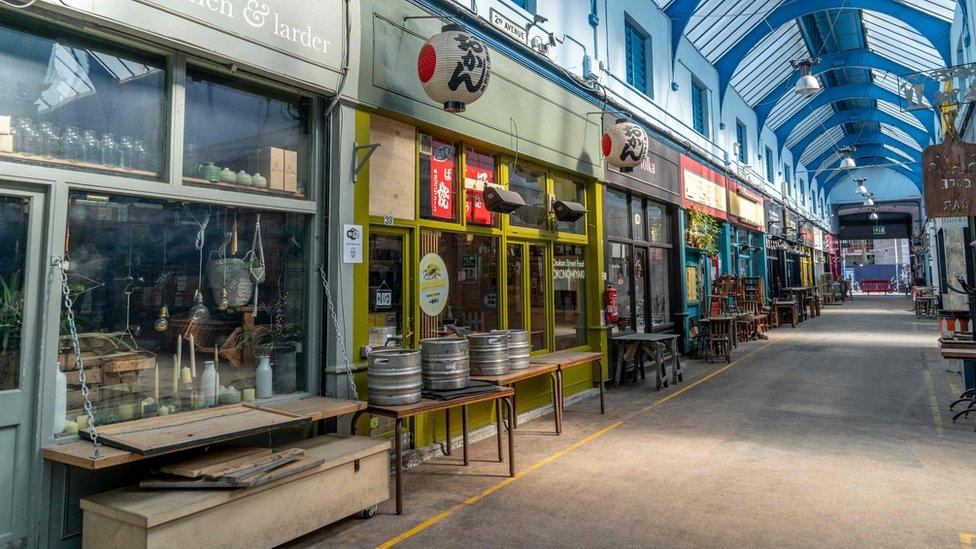
- Published1 January 2014
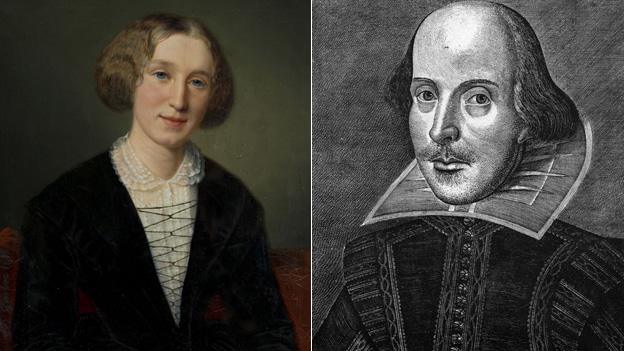
- Published3 May 2011
